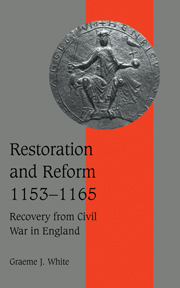Book contents
- Frontmatter
- Contents
- Preface
- List of abbreviations
- 1 The political context
- 2 The governance of England during Stephen's reign
- 3 Personnel and property
- 4 Financial recovery
- 5 The administration of justice
- 6 Conclusion
- Appendix I sheriffs' farms, 1130–65 and 1197
- Appendix II pipe roll, 11 Henry II (1164–5)
- Select bibliography
- Index
- Cambridge Studies in Medieval Life and Thought Fourth series
2 - The governance of England during Stephen's reign
Published online by Cambridge University Press: 03 September 2009
- Frontmatter
- Contents
- Preface
- List of abbreviations
- 1 The political context
- 2 The governance of England during Stephen's reign
- 3 Personnel and property
- 4 Financial recovery
- 5 The administration of justice
- 6 Conclusion
- Appendix I sheriffs' farms, 1130–65 and 1197
- Appendix II pipe roll, 11 Henry II (1164–5)
- Select bibliography
- Index
- Cambridge Studies in Medieval Life and Thought Fourth series
Summary
INTRODUCTION
Stephen's reign is so commonly associated with ‘Anarchy’ that it is worth reminding ourselves that no contemporary chronicler used the word. There were plenty of alternatives – furor, caedes, rapina, perturbatio, miseria, tragœdia – but anarchia was not familiar to twelfth-century Latinists. Seventeenth- and eighteenth-century writers also covered the troubles of this period without using the term, and although Henry Hallam's View of the State of Europe during the Middle Ages, first published in 1818, contained a dismissive reference to the reign as one of ‘anarchy and intestine war’, it was not until the closing decades of the century that the word came to be applied with any consistency. This was largely the result of the work published during the 1870s by Edward Freeman and William Stubbs. For Free man, this was a time of ‘utter anarchy’ and ‘utter wretchedness, such as we may safely say that England never saw before and never saw again’. Stubbs's Constitutional History bemoaned ‘that feudal anarchy which had sometimes prevailed abroad but never before in England’, while his Select Charters showed how a mixture of disputed succession, misgovernment and baronial opportunism led to ‘war, and anarchy succeeding war’. The 1880s and 1890s were the decades when Anarchism as a social and political philosophy enjoyed brief notoriety in Britain, spawning a series of minority-interest journals and influencing the work of, among others, William Morris and Oscar Wilde, and it was now that Stephen's ‘anarchy’ was consistently awarded a capital ‘A’.
- Type
- Chapter
- Information
- Restoration and Reform, 1153–1165Recovery from Civil War in England, pp. 12 - 76Publisher: Cambridge University PressPrint publication year: 2000



